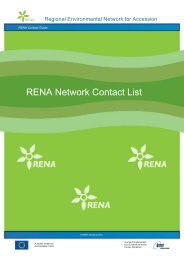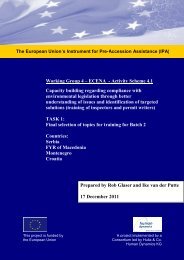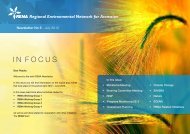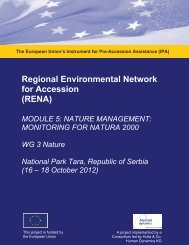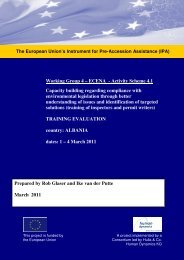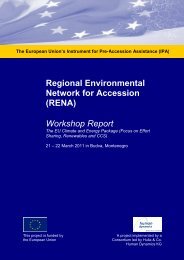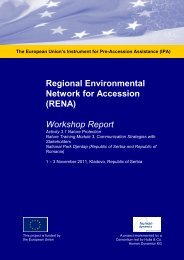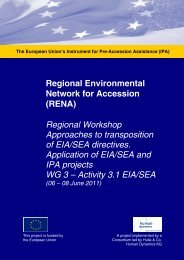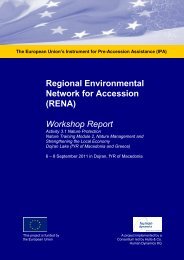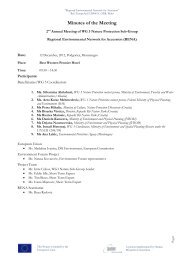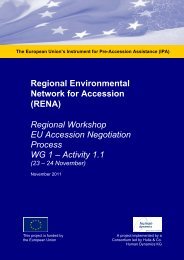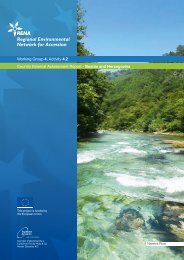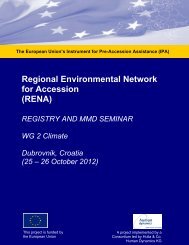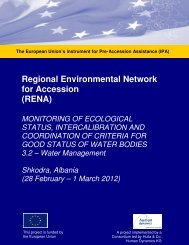3rd Interim report September 2011- March 2012.pdf - Renanetwork.org
3rd Interim report September 2011- March 2012.pdf - Renanetwork.org
3rd Interim report September 2011- March 2012.pdf - Renanetwork.org
You also want an ePaper? Increase the reach of your titles
YUMPU automatically turns print PDFs into web optimized ePapers that Google loves.
“Regional Environmental Network for Accession”<br />
Ref: EuropeAid/128906/C/SER/Multi<br />
Mr. Blinkov from the Macedonian Ministry also agreed that the training was very useful especially in<br />
relation with the cement plants. He asked if it is possible in future to put the training and information<br />
materials on a USB considering the size and volume.<br />
Ms. Anita Pokrovac Patekar, National Coordinator for Croatia, expressed that it will be very useful if<br />
bilateral exchange is <strong>org</strong>anized, where practical trainings in a particular cement industry will be<br />
conducted, together with operators and inspectors which will help in exchanging experiences regarding<br />
modernization and incineration technologies. She proposed this to be considered as one of the next<br />
RENA activities.<br />
Also Mr. Enes Tela from the Albanian inspectorate and Ms Florie Kqiku mentioned that the training<br />
courses were very useful and that in general all inspectors were very satisfied with the programme.that<br />
has been carried out.<br />
Presentation of Cluster 2 activities – Institutional and methodological Development<br />
Activity 2: Country external assessments, Case Serbia<br />
Mr. Ike Van der Putte gave a short introduction on the Cluster 2, activity 2 Country external<br />
assessments. The countries were visited by the respective experts, interviews were held with various<br />
stakeholders and an analysis was made of the collected materials. Based on the elements of the<br />
regulatory cycle, draft <strong>report</strong>s have been prepared which were sent out to the Ministry for obtaining<br />
comments. He pointed out that the activity will be finished by the end of this year in which the <strong>report</strong>s<br />
for Serbia, fYR of Macedonia and Montenegro are considered to be finalized, and the <strong>report</strong>s for<br />
Albania, Kosovo under UNSCR1244 /99 , BiH and Turkey are in the preparatory phase, i.e. to be<br />
finalized in January 2012. The assessment is done evaluating the national, regional and local<br />
environmental capacity covering the whole regulatory cycle of policy, legislation, permitting, verification<br />
and control, monitoring and <strong>report</strong>ing, focusing specifically on the issues of permitting, inspection and<br />
enforcement.<br />
Country external assessment. Case Serbia<br />
Mr. Dragoljub Todic presented the <strong>report</strong> he prepared for the external assessment of Serbia. The<br />
methodology for preparation is based on the regulatory cycle where the first step is policy, followed by<br />
legislation, implementation with permitting and enforcement and feedback <strong>report</strong>ing. The basic<br />
methodology had three elements in which the 1 st one is the analysis of documentation which includes<br />
an analysis of strategic documents, <strong>report</strong>s and answers in the European Commission questionnaires<br />
for progress monitoring. The 2 nd phase was preparing questionnaires and sending them to the business<br />
sector, NGOs and Ministry staff working on permits, in the provincial and local self government units.<br />
At the final <strong>3rd</strong> stage interviews with some of the relevant stakeholders were performed.<br />
Furthermore Mr. Todic explained the subjects considered in preparation of the <strong>report</strong>, with a<br />
comprehensive analysis of policy, legislation, strategic documents, harmonization with EU legislation,<br />
permitting and enforcement, monitoring responsibilities, <strong>report</strong>ing, access to information and public<br />
participation, control and enforcement, appeals, and capacity building programmes for public<br />
authorities. The <strong>report</strong> also contains information on the response to the Environmental Acquis and<br />
governmental plans for joining the European Union. The transposition implications and involved<br />
institutions in implementation of the Environmental Acquis are also considered. The <strong>report</strong> also<br />
includes a review of local self government and public utility companies and their role in implementation<br />
of environmental legislation.<br />
At the end of the presentation Ms. Ivanica pointed out that according to the Commission on a general<br />
level Serbia made progress in approximation of the environmental acquis comparing with previous<br />
years.<br />
Mr. Rob Glaser asked about the structure of the environmental inspectorate in Serbia, is it an<br />
independent body or not On this question Mr. Todic answered that there is an initiative for placing<br />
the inspectorate in one separated agency. This agency will cover all activities related to inspection and<br />
Page5<br />
This Project is funded by the<br />
European Union<br />
A project implemented by Human<br />
Dynamics Consortium



